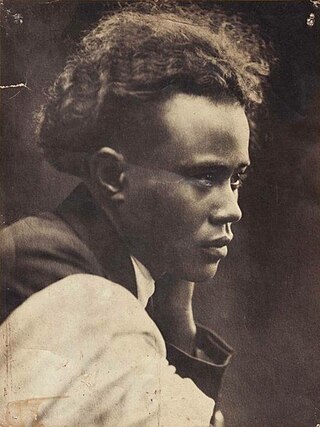
Madagascar, officially the Republic of Madagascar and the Fourth Republic of Madagascar, is an island country comprising the island of Madagascar and numerous smaller peripheral islands. Lying off the southeastern coast of Africa, it is the world's fourth largest island, the second-largest island country and the 46th largest country in the world. Its capital and largest city is Antananarivo.

Religion is a range of social-cultural systems, including designated behaviors and practices, morals, beliefs, worldviews, texts, sanctified places, prophecies, ethics, or organizations, that generally relate humanity to supernatural, transcendental, and spiritual elements—although there is no scholarly consensus over what precisely constitutes a religion. Different religions may or may not contain various elements ranging from the divine, sacredness, faith, and a supernatural being or beings.

Demographic features of the population of Madagascar include population density, ethnicity, education level, health of the populace, economic status, religious affiliations and other aspects of the population.

Guru is a Sanskrit term for a "mentor, guide, expert, or master" of certain knowledge or field. In pan-Indian traditions, a guru is more than a teacher: traditionally, the guru is a reverential figure to the disciple or student, with the guru serving as a "counselor, who helps mold values, shares experiential knowledge as much as literal knowledge, an exemplar in life, an inspirational source and who helps in the spiritual evolution of a student". Whatever language it is written in, Judith Simmer-Brown says that a tantric spiritual text is often codified in an obscure twilight language so that it cannot be understood by anyone without the verbal explanation of a qualified teacher, the guru. A guru is also one's spiritual guide, who helps one to discover the same potentialities that the guru has already realized.

The highly diverse and distinctive music of Madagascar has been shaped by the musical traditions of Southeast Asia, Africa, Oceania, Arabia, England, France and the United States over time as indigenous people, immigrants, and colonists have made the island their home. Traditional instruments reflect these widespread origins: the mandoliny and kabosy owe their existence to the introduction of the guitar by early Arab or European seafarers, the ubiquitous djembe originated in mainland Africa and the valiha—the bamboo tube zither considered the national instrument of Madagascar—directly evolved from an earlier form of zither carried with the first Austronesian settlers on their outrigger canoes.

Jean-Joseph Rabearivelo, born Joseph-Casimir Rabearivelo, was a Malagasy poet who is widely considered to be Africa's first modern poet and the greatest literary artist of Madagascar. Part of the first Malagasy generation raised under French colonization, Rabearivelo grew up impoverished and failed to complete secondary education. His passion for French literature and traditional Malagasy oral poetry (hainteny) prompted him to read extensively and educate himself on a variety of subjects, including the French language and its poetic and prose traditions. He published his first poems as an adolescent in local literary reviews, soon obtaining employment at a publishing house where he worked as a proofreader and editor of its literary journals. He published numerous poetry anthologies in French and Malagasy as well as literary critiques, an opera, and two novels.

Eusèbe Jaojoby, commonly known by his surname Jaojoby, is a Malagasy composer and singer of salegy, a musical style of northwestern Madagascar. Critics consider him to be one of the originators of the modern salegy style that emerged in the 1970s, and credit him with transforming the genre from an obscure regional musical tradition into one of national and international popularity. Jaojoby also contributed to the creation of two salegy subgenres, malessa and baoenjy. Jaojoby has been called the most popular singer in Madagascar and the Indian Ocean islands, and is widely referred to as the "King of Salegy". His success has earned him such honors as Artist of the Year in Madagascar for two consecutive years (1998–1999) and the role of Goodwill Ambassador for the United Nations Population Fund in 1999.

The Malagasy paradise flycatcher is a species of bird in the family Monarchidae. It is found in Comoros, Madagascar, and Mayotte. Its natural habitats are subtropical or tropical dry forest and subtropical or tropical moist lowland forest.
Hainteny is a traditional form of Malagasy oral literature and poetry, involving heavy use of metaphor. It is associated primarily with the Merina people of Madagascar. In its use of metaphor and allusion it resembles another type of poetry, the Malay pantun, and Fox suggests "it seems likely the Merina brought with them a Malayo-Polynesian poetic tradition" to Madagascar. The Ibonia, an epic poem related for centuries in different versions across Madagascar, reflects the value placed on the linguistic skills celebrated in the hainteny tradition, and offers insight into the diverse mythologies and beliefs of traditional Malagasy communities.
Sanātana Dharma is an alternative term used by some Hindus to refer to Hinduism instead of the term Hindu Dharma. The term is found in Sanskrit and other Indian languages. It is generally used to signify a more traditional outlook of Hinduism.

Andriana was both the noble class and a title of nobility in Madagascar. Historically, many Malagasy ethnic groups lived in highly stratified caste-based social orders in which the Andriana were the highest strata. They were above the Hova and Andevo (slaves). The Andriana and the Hova were a part of Fotsy, while the Andevo were Mainty in local terminology.

The Malagasy Lutheran Church is one of the most important Christian churches in Madagascar, established in 1950 by the unification of 1,800 Lutheran congregations in central and southern Madagascar. The oldest of these congregations was founded in the early 19th century with the arrival of missionaries from the Norwegian Missionary Society (NMS).

Malagasy is an Austronesian language and dialect continuum spoken in Madagascar. The standard variety, called Official Malagasy, is an official language of Madagascar alongside French.
Maanyan or Maʼanyan is an Austronesian language belonging to the East Barito languages. It is spoken by about 150,000 Ma'anyan people living in the province of Central Kalimantan and South Kalimantan, Indonesia. It is most closely related to the Malagasy language spoken in Madagascar, although these languages are not mutually intelligible due to the geographical separation.

Hadropithecus is a medium-sized, extinct genus of lemur, or strepsirrhine primate, from Madagascar that includes a single species, Hadropithecus stenognathus. Due to its rarity and lack of sufficient skeletal remains, it is one of the least understood of the extinct lemurs. Both it and Archaeolemur are collectively known as "monkey lemurs" or "baboon lemurs" due to body plans and dentition that suggest a terrestrial lifestyle and a diet similar to that of modern baboons. Hadropithecus had extended molars and a short, powerful jaw, suggesting that it was both a grazer and a seed predator.
"Spiritual but not religious" (SBNR), also known as "spiritual but not affiliated" (SBNA), or less commonly "more spiritual than religious" is a popular phrase and initialism used to self-identify a life stance of spirituality that does not regard organized religion as the sole or most valuable means of furthering spiritual growth. Historically, the words religious and spiritual have been used synonymously to describe all the various aspects of the concept of religion, but in contemporary usage spirituality has often become associated with the interior life of the individual, placing an emphasis upon the well-being of the "mind-body-spirit", while religion refers to organizational or communal dimensions. Spirituality sometimes denotes noninstitutionalized or individualized religiosity. The interactions are complex since even conservative Christians designate themselves as "spiritual but not religious" to indicate a form of non-ritualistic personal faith.

Elie Rajaonarison was a poet, artist, professor and civil servant from Madagascar. Considered the standard-bearer for modern Malagasy poetry, Rajaonarison's published poetry anthologies earned him international recognition and have been translated into French and English.

Accounts of Jews in Madagascar go back to the earliest ethnographic descriptions of the island, from the mid-17th century. Madagascar has a small Jewish population, including normative adherents as well as Judaic mystics, but the island has not historically been a significant center for Jewish settlement. Despite this, an enduring origin myth across Malagasy ethnic groups suggests that the island's inhabitants descended from ancient Jews, and thus that the modern Malagasy and Jewish peoples share a racial affinity. This belief, termed the "Malagasy secret", is so widespread that some Malagasy refer to the island's people as the Diaspora Jiosy Gasy. As a result, Jewish symbols, paraphernalia, and teachings have been integrated into the syncretic religious practices of some Malagasy populations. Similar notions of Madagascar's supposed Israelite roots persisted in European chronicles of the island until the early 20th century, and may have influenced a Nazi plan to relocate Europe's Jews to Madagascar. More recently, the possibility of Portuguese Jewish conversos making contact with Madagascar in the 15th century has been proposed.

Christianity in Madagascar is practiced by 85.3% of Madagascar's population according to the Pew Research Center in 2020. However, other surveys put the figure at 58%. Malagasy Christianity is generally practised in syncretic form with traditional religious practices.
In Malagasy culture, fady are a wide range of cultural prohibitions or taboos. People, places, actions or objects may be the subject of fady, which vary by region within Madagascar. The taboos are believed to be enforced by supernatural powers, and are particularly connected with Malagasy ancestor worship. Although some are held nationwide, others may be particular to regions, villages or even individual families. Fady are an integral part of Malagasy identity and play an important part in community and identity formation. The word is a descendant of Proto-Austronesian *paliSi.













